We are IPEM
IPEM welcomes everyone with a professional interest in medical physics and clinical engineering.
Meet some of our individual members.
Daniela Sabella MIPEM (Full Member, joined 2015)
Trust Medical Device Safety Officer, King’s College Hospital NHS Foundation Trust
Tell us about a typical work day, what is your role and what does it involve?
As the Trust Medical Device Safety Officer at King’s College Hospital NHS FT, my role encompasses a range of responsibilities related to the safety of medical devices. This includes conducting regular reviews of incident reports involving medical equipment, leading investigations of adverse incidents, and providing support in the implementation of safety recommendations.
Depending on the nature of the incident and information provided, I determine whether a technical investigation is required or whether the reporting department needs assistance in conducting their own investigation.
Additionally, I ensure that the Trust complies with national patient safety alerts and manufacturer’s Field Safety Notices related to medical equipment. My team is responsible for communicating such alerts to relevant departments, formulating action plans, and ensuring all actions are completed and documented for traceability. Compliance with National Patient Safety Alerts is subject to CQC audits, which may result in regulatory actions if there is non-compliance. Therefore, maintaining traceability of the Trust’s response is vital.
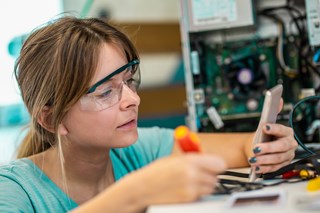
Which elements of your job do you like the most?
One of the most appealing aspects of my job is the unpredictable nature of the challenges I face on a daily basis. Each day presents a unique set of circumstances and opportunities to learn and grow as a healthcare professional. For instance, I may investigate an incident involving unfamiliar medical equipment and have to use critical thinking and problem-solving skills to find the root cause and prevent it from recurring, or I may collaborate with frontline staff and management to create and implement a plan to address a newly identified patient safety risk.
Overall, each challenge I face provides an opportunity to gain a deeper understanding of the complexities of patient care and the healthcare sector more broadly.
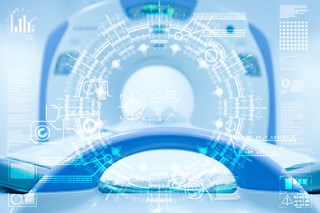
What are the biggest challenges you see – either for yourself or the sector?
As part of the Clinical Engineering community, I believe the most significant challenge on the horizon is the rapidly changing healthcare delivery landscape, driven by the advent of new technology and innovative care delivery models. While these advancements offer unprecedented opportunities to enhance patient care, they also pose new patient safety risks that require careful consideration.
For example, medical equipment with complex software and AI can cause unforeseen errors, while virtual wards and remote monitoring can create gaps in patient communication and monitoring, compromising patient safety.
Moreover, the emergence of new forms of medical device service contracts, such as managed equipment services, consumable deals, and outsourced services can lead to issues related to maintenance, reliability, and quality control, if not well managed, which can also pose a threat to patient safety.
To mitigate these risks, healthcare professionals must remain vigilant and informed about these developments. They must also work collaboratively with technology vendors, policymakers, and other stakeholders to ensure
that the new technologies and care delivery models are safe, effective, and aligned with best practices in patient safety. By doing so, healthcare professionals can help to safeguard patients from potential harm and ensure that they receive the highest quality of care possible.
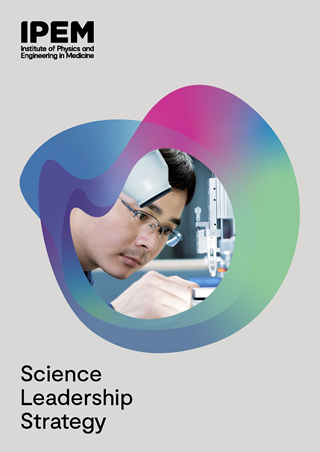
IPEM’s Science Leadership Strategy is all about identifying and anticipating what might impact the working environment of our members now and in the near future. What are your predictions about the future of your profession or area of specialty?
I believe that as healthcare delivery continues to evolve, there is growing interest in the delivery of patient care from the patient’s home or from the community, and in the use of virtual wards as a means of providing more efficient and accessible care. While these new models of care have the potential to revolutionise healthcare delivery, they also pose unique
challenges and risks that must be carefully managed to ensure patient safety.
As a Clinical Engineer, I believe that our profession will play an important role in supporting the safe and effective implementation of these new care models. However, I also recognize that many current Clinical Engineering departments may not be fully prepared to manage the safety of medical equipment in these new systems. To effectively manage the risks associated with virtual wards and remote care, Clinical Engineers will need to have a deep understanding of the unique technical and operational requirements of these systems. This may include developing new protocols for equipment testing and maintenance, as well as ensuring that adequate training and support is provided to patients, carers and healthcare providers.
In addition, Clinical Engineers will need to stay abreast of emerging technologies and standards related to virtual care, and be willing to adapt and innovate in response to new challenges and opportunities. Ultimately, by working closely with other healthcare professionals and stakeholders, we can help to ensure that virtual wards and other new models of care are implemented safely and effectively, and that patients continue to receive the high-quality care they need and deserve.
I believe that this is in line with or complementary to the emerging trend of Personalized Health, as identified in IPEM's Science Leadership Strategy.

What skillsets do you think are required to be successful in your role, and is there a particular career path or training option you would recommend?
As a professional in my field, I believe that the following three skills are crucial for me to perform at my best:
Critical and System Thinking: the ability to analyse complex problems, identify patterns, consider impact and make informed decisions based on data and evidence.
Curiosity: a strong desire to learn and understand new things, an open-minded approach to exploring different perspectives and ideas, and a willingness to ask questions and seek out answers.
Active Listening: paying close attention to what others are saying and seeking to understand their perspectives. The ability to ask questions and clarify information, as well as to empathise with others and consider their needs and concerns.
In addition to these skills, I am currently enrolled in a Patient Safety and Clinical Human Factors MSc course. This focuses on improving the reliability and safety of healthcare systems and processes by incorporating human factors principles into the design and management of these systems. I highly recommend this course to anyone interested in improving patient safety and optimising healthcare delivery.
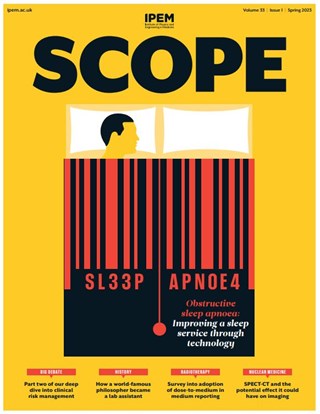
Why did you join IPEM?
In 2014, upon moving to the UK, I became a member of IPEM. My primary motivation for joining was to gain access to a professional network that could assist me in learning and developing within the UK healthcare system which was unfamiliar territory for me at the time.
What benefits did you find useful as a member of IPEM?
As a pre-registered Clinical Scientist (Root 2) in the specialty of Clinical Engineering, I actively utilise the resources provided by IPEM to stay up-to-date with the latest industry developments and opportunities for professional networking. Specifically, I leverage the IPEM website to identify relevant events and conferences, while also keeping abreast of industry news through regular readership of Scope magazine.
Additionally, I make use of the mycareerpath service to effectively
plan, document, and track my Continuing Professional Development (CPD) progress. As part of my registration process as Clinical Scientist, I have been receiving oversight and guidance from a senior member of the organisation throughout my training program.
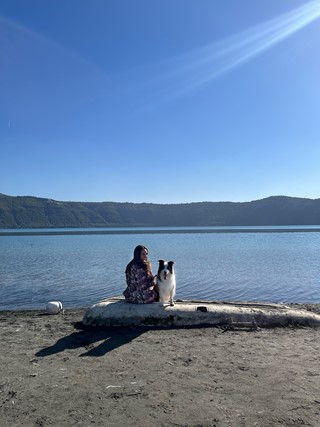
Finally, what do you like to do in your free time?
One of my greatest passions is travelling the world with my husband and family. I love exploring new destinations throughout my native beautiful Italy and have developed a profound affection for the cultures and untamed wilderness of the Asian continent.
In my spare time, I enjoy being with Harvey, my two-year-old Border Collie. He is extremely active and requires plenty of physical and mental exercise which has encouraged me and my husband to adopt a more active and healthy lifestyle. My bond with Harvey is special and spending time with him brings me immense joy and happiness.